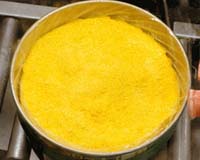 |
Washington (AFP) April 13, 2010 President Barack Obama declared the world safer Tuesday after a 47-nation summit agreed to a four-year deadline on securing vulnerable nuclear materials from terrorists. "Because of the steps we've taken," Obama told a news conference following the summit in Washington, "the American people will be safer and the world will be more secure." The unprecedented gathering met the challenge posed by Obama, who said the world was littered with poorly guarded fissile material and that a nuclear-armed militant group would threaten "catastrophe." "We welcome and join President Obama's call to secure all vulnerable nuclear material in four years, as we work together to enhance nuclear security," the leaders said in a joint communique. Hosting the largest summit in the United States in over six decades, Obama also pressed China and other UN Security Council skeptics to back UN sanctions on Iran over its controversial nuclear program. "I am going to push as hard as I can to make sure that we get strong sanctions that have consequences for Iran," Obama said at the end of the summit. Amid mixed signals from Beijing, Chinese President Hu Jintao told the summit that Beijing "firmly" opposes atomic weapons proliferation, while backing civilian uses. On what are commonly referred to as loose nukes, Obama pressed his guests "not simply to talk, but to act." "Nuclear materials that could be sold or stolen and fashioned into a nuclear weapon exist in dozens of nations," Obama said. He said Al-Qaeda had tried to obtain a nuclear bomb and that radioactive material as small as an apple was enough to kill thousands of people. "It would be a catastrophe for the world -- causing extraordinary loss of life, and striking a major blow at global peace and stability." The summit leaders agreed in their communique to non-binding, only partly defined measures to combat nuclear trafficking, including sharing information and detection, forensics and law enforcement expertise. The leaders said they "recognize the need for cooperation among states to effectively prevent and respond to incidents of illicit nuclear trafficking." But increased security must "not infringe upon the rights of states to develop and utilize nuclear energy for peaceful purposes and technology," summit participants said. Mexico gave Obama's initiative a boost by agreeing to give up weapons-grade uranium. Ex-Soviet Ukraine and Canada made similar pledges on Monday after Chile's earlier moves. Russian Foreign Minister Sergei Lavrov announced plans to spend up to 2.5 billion dollars to dispose of plutonium from its massive defense program. Russia and the United States also signed a new protocol pledging to complete the disposal of 34 tons of excess weapons-grade plutonium each, enough to make 17,000 weapons. Meanwhile, Obama appealed for 10 billion dollars in an initiative with Canada to improve nuclear security worldwide. The US president addressed fears about the nuclear arsenal in Pakistan, a major stronghold for Al-Qaeda and militant groups at war with US forces in Afghanistan, saying he felt "confident" about security levels. "But that doesn't mean that there isn't improvement to make," Obama said. In parallel with the drive against loose nukes, Obama used the summit to drum up support on the US drive to slap a fourth round of UN sanctions against Iran over its nuclear drive. Washington accuses Tehran of seeking to produce nuclear weapons, but Iran insists it is only pursuing civilian nuclear power. Obama discussed the sanctions with Hu, a crucial partner since China, a big economic partner of Iran, has veto power in the UN Security Council. China's foreign ministry meanwhile reaffirmed its long-held skepticism about the need for sanctions, saying that "pressure and sanctions cannot fundamentally solve" the standoff. But the White House was optimistic about chances of getting China on board. German Chancellor Angela Merkel, who backs sanctions, said she was "very hopeful." Obama also met with the leaders of Brazil and Turkey, both non-permanent members of the UN Security Council reluctant to support sanctions. In his address to the summit, Hu gave few clues, saying China opposed nuclear weapons proliferation, while also underlining that China backs "the equal right of all countries to the peaceful use of nuclear energy." The New York Times reported that Obama was offering to help China maintain steady fuel deliveries if sanctions against Iran led to a disruption of oil supplies. Iran defiantly said it was organizing its own nuclear conference to be held in Tehran on Saturday and Sunday with foreign ministers from 15 countries. A manual on securing stocks of separated plutonium and weapons grade uranium, as well as advice on how to dispose of the dangerous materials, was issued at the end of the Washington summit. However, all the steps are voluntary and the plan for accomplishing the four-year plan remains sketchy.
Share This Article With Planet Earth
Related Links Nuclear Power News - Nuclear Science, Nuclear Technology Powering The World in the 21st Century at Energy-Daily.com
 Ukraine to dispose of all highly enriched uranium
Ukraine to dispose of all highly enriched uraniumWashington (AFP) April 12, 2010 Ukraine pledged Monday to dispose of its stocks of highly enriched uranium by 2012, as the United States vowed to work with the nation still haunted by the Chernobyl accident over two decades ago. The surprise announcement came in a joint statement after US President Barack Obama met for the first time with Ukrainian President Viktor Yanukovych, who took office in the former Soviet republic ... read more |
|
| The content herein, unless otherwise known to be public domain, are Copyright 1995-2010 - SpaceDaily. AFP and UPI Wire Stories are copyright Agence France-Presse and United Press International. ESA Portal Reports are copyright European Space Agency. All NASA sourced material is public domain. Additional copyrights may apply in whole or part to other bona fide parties. Advertising does not imply endorsement,agreement or approval of any opinions, statements or information provided by SpaceDaily on any Web page published or hosted by SpaceDaily. Privacy Statement |